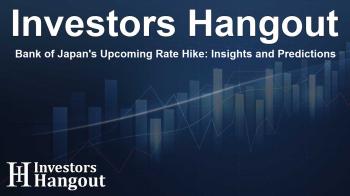Bank of Japan's Upcoming Rate Hike: Insights and Predictions

Bank of Japan's Interest Rate Predictions
As the financial world keenly watches, the Bank of Japan is poised to implement an interest rate hike, potentially raising rates to 0.50% during one of its forthcoming meetings. A recent poll conducted has shown that a substantial majority of surveyed economists anticipate this increase, with many believing it may occur as soon as January.
The Shift in Monetary Policy
This consensus reflects the BOJ's intention to transition towards a more conventional monetary policy after an extensive period of extraordinarily accommodative measures. In fact, while numerous global central banks are leaning towards cuts, the BOJ's actions suggest a firm resolve to move in the opposite direction.
Insights from the Latest Poll
In a survey conducted from January 8 to 15, it appears that out of 61 economists, 59 predict that the BOJ will hike borrowing costs to 0.50% by the end of March. Notably, among the 32 who have specified a timeframe for this hike, nearly two-thirds indicated they expect the increase to occur during the January 23-24 meeting.
Factors Influencing the Decision
With the BOJ having opted to maintain rates in December, many analysts have been speculating on the timing of a future increase. This is largely fueled by uncertainties surrounding domestic wages and economic policies from the soon-to-be-causing effects of the U.S. elections.
Economists Weigh in on Wage and Price Pressures
Analysts like Ayako Fujita from JPMorgan have indicated that robust domestic wage growth, alongside new pricing pressures, strengthen the case for a potential January rate hike. Fujita notes, "Should there be no significant market disarray following the inauguration of the incoming U.S. administration, it could lead to perceptions of unnecessary volatility risk if the hike were postponed until March."
Current Economic Context
The BOJ has recently highlighted a broadening trend of wage hikes across a variety of sectors, signalling favorable conditions for a potential near-term increase. After previously ending negative interest rates in March, the central bank had raised its short-term policy target to 0.25% last July, suggesting readiness for more hikes if economic indicators remain consistent.
Inflation Concerns on the Horizon
In examining inflation trends, almost all economists, save for one, indicated a greater likelihood of inflation rising beyond initial forecasts this year. Harumi Taguchi from S&P Global asserted, "The risks of inflation escalating seem predominantly higher, particularly due to persistent concerns about a weaker yen and its influence on import costs."
Labour Negotiations and Pay Increases
Discussions about this year's salary negotiations highlight a median increase anticipation of approximately 4.75%, a slight increase compared to the previous month's poll. This figure is below last year's 5.1% but it is still an improvement from the previous year's 3.58%.
The Weak Yen's Impact
The depreciation of the yen has indeed resulted in elevated import costs, contributing to the inflationary pressures that the BOJ has had to contend with. Analysts caution that this is a critical factor influencing the BOJ's decision-making process regarding future interest rates.
Market Intervention Expectations
According to the poll results, around two-thirds of participants expressed belief that Japanese authorities would take measures to intervene in the currency market should the yen depreciate to around 165 against the U.S. dollar. This level of currency intervention consideration underscores the sensitivity of the current economic climate.
Frequently Asked Questions
Why is the Bank of Japan raising interest rates?
The BOJ is raising rates to shift towards a more normal monetary policy following years of low interest rates, primarily to combat rising inflation.
What might be the implications of a rate hike?
A rate increase may bolster the yen and ease inflationary pressures, but it could also slow down economic growth depending on how businesses and consumers react.
When does the BOJ plan to implement the rate hike?
Analysts predict the increase will occur by March, with many leaning towards the upcoming January meeting for the implementation.
How are economists feeling about inflation forecasts?
Most economists now suggest that inflation could rise more than previously expected, influenced by domestic wage increases and currency fluctuations.
What are the factors driving the decision for a rate hike?
The key drivers include strong wage growth, rising prices, and the overall economic conditions that signal a need for a strategic monetary policy adjustment.
About Investors Hangout
Investors Hangout is a leading online stock forum for financial discussion and learning, offering a wide range of free tools and resources. It draws in traders of all levels, who exchange market knowledge, investigate trading tactics, and keep an eye on industry developments in real time. Featuring financial articles, stock message boards, quotes, charts, company profiles, and live news updates. Through cooperative learning and a wealth of informational resources, it helps users from novices creating their first portfolios to experts honing their techniques. Join Investors Hangout today: https://investorshangout.com/
The content of this article is based on factual, publicly available information and does not represent legal, financial, or investment advice. Investors Hangout does not offer financial advice, and the author is not a licensed financial advisor. Consult a qualified advisor before making any financial or investment decisions based on this article. This article should not be considered advice to purchase, sell, or hold any securities or other investments. If any of the material provided here is inaccurate, please contact us for corrections.
